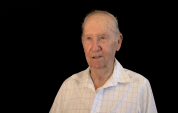5:33 | Harold Dudley was busy with preparations for the Normandy invasion, working in the unlikely location of French Equatorial Africa. There was massive amounts of air traffic in all directions, dependent on the communications and navigation equipment he set up. His unit also escorted planes through the treacherous desert sandstorms. (This interview made possible with the support of CHESTER RUST.)
Keywords : Harold Dudley French Equatorial Africa Normandy D-Day Nigeria Freetown Liberia Senegal Goree Island slave Sahara Atar Mauritania Camel Corps French Foreign Legion Azores escort desert sandstorm Dakar Casablanca Morocco Marrakesh Algiers

Harold Dudley's first contribution to the war effort came at Mobile Bay in Alabama, where he was a machine gunner on a fishing boat. Going from the National Guard into the Air Corps, he became a heavy bomber gunner and communications NCO. Deployed to North Africa, he had to reroute to the Belgian Congo because of German submarine activity. (This interview made possible with the support of CHESTER RUST.)
While Harold Dudley's unit was attached to the RAF in Khartoum, he managed some great R&R to visit Egypt and Asmara in the mountains of Ethiopia. Setting up communications at air fields was his business and while doing that in Saudi Arabia, he met a highly esteemed VIP. (This interview made possible with the support of CHESTER RUST.)
Harold Dudley describes the navigation equipment he installed at far flung airfields in Africa. He had to fly to Italy and back on supply runs and on one of these flights, a hitchhiking senior pilot took command of the plane and promptly got them lost. The policy which allowed this was changed due to this incident. (This interview made possible with the support of CHESTER RUST.)
When he got to Marseille, Harold Dudley continued to set up communications and navigation equipment at airfields, just as he had been doing in Africa. He had to take a side trip to Lyon to help out his brother, who had gotten into some trouble. His brother rose above that incident to do good work for NASA after the war. (This interview made possible with the support of CHESTER RUST.)
When VE Day had come and gone, there was an concerted effort to keep all the men in theater busy. In Marseille, Harold Dudley went to radio teletype school. When he heard the war was over on the BBC radio broadcast, he made a mess of his tent. Then, a long period of waiting and frustration set in. (This interview made possible with the support of CHESTER RUST.)
Harold Dudley was twenty miles inland, but a German air raid on ammunition supply ships in an Italian harbor knocked him out of his cot. The Germans still had air power in Italy. (This interview made possible with the support of CHESTER RUST.)
During his service in the Air Corps, Harold Dudley had two close calls in wildly different places. One was over a highway near Nashville and the other was in the jungle in Equatorial Africa. (This interview made possible with the support of CHESTER RUST.)
When the war first started, and Harold Dudley was guarding Mobile Bay for the Alabama National Guard, two German spies were captured. They had come ashore from submarines. The Germans on the U-boats were brazen, even taunting those ashore through megaphones. (This interview made possible with the support of CHESTER RUST.)
After the big war, Army Air Corps veteran Harold Dudley was active in ROTC at college and participated in extensive MP training. His expertise was tested when he was serving at Fort Benning and given orders to clean up the cesspool at nearby Phenix City, Alabama. (This interview made possible with the support of CHESTER RUST.)